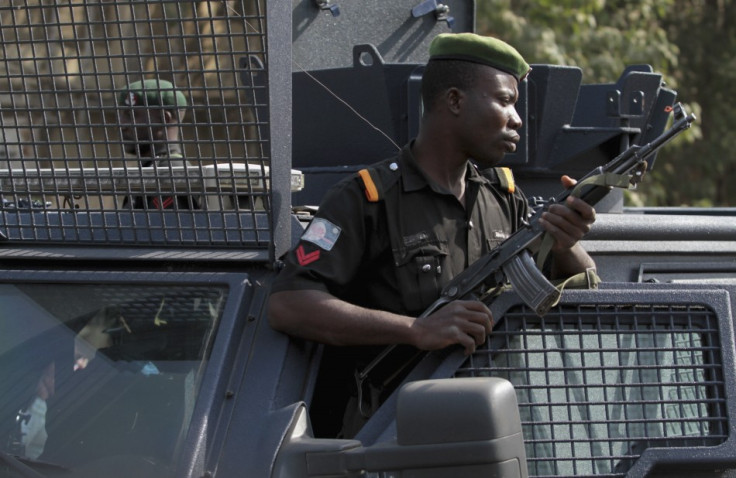Nigeria Boko Haram: 8 policemen die in bomb blast in Borno as President Buhari to meet Chibok girls activists

At least eight members of the Borno State Command of the Nigerian Police have been killed in a bomb blast in Damboa, Borno state.
It is believed that the men were killed after they were returning to the capital Maiduguri, where newly elected President Muhammadu Buhari relocated the military operational headquarters to strengthen the fight against Boko Haram (recently renamed Iswap) terrorists.
Who are Nigeria's Boko Haram terrorists?
Boko Haram fights against Western influence in Nigeria and aims to impose its version of Sharia law on the country. The group declared an Islamic caliphate in Gwoza, along the Cameroon border, in August 2014.
Boko Haram has raided several cities in the north of the country in a bid to take control of more land.
Three states − Adamawa, Borno and Yobe − have been under a state of emergency since May 2013, due to Boko Haram's attacks.
The group has killed at least 2,600 people since the beginning of 2015. More than 180 have been killed since the beginning of June.
The men had left the capital with members of the Power Holding Company of Nigeria (PHCN) to rectify some electrical faults in Damboa, an official who spoke under conditions of anonymity told The Cable.
"They were on their way back when they ran into bomb set by Boko Haram," the source said. "I am sure they saw them when they were going and set the trap. I can't tell of the PHCN people but eight of our officers were killed in that attack."
The latest attack occurred days after Buhari, a former military chief, met with regional leaders to discuss tactics to defeat the terrorists.
The Nigerian government is being aided by mercenaries and troops from neighbouring countries Chad, Benin, Niger and Cameroon in its offensive and has scored some successes since the military cooperation started in February.
The US announced it would send military trainers to help the Nigerian army improve its intelligence gathering and logistics.
Buhari is also to meet with activists from Bring Back Our Girls, a movement born in the aftermath of a mass abduction by Boko Haram which occurred in Chibok, Borno, last April.
The terrorists kidnapped some 220 girls who are still missing, amid reports they are being used in suicide bomb missions, being married off or sold as slaves.
More about Nigeria
Colonisation
Between 1790 and 1807, Britain acquired an estimated 2,000 slaves per year from Lagos, Nigeria's largest city. In 1807, Britain stopped the practice after the implementation of the Slave Trade Act and annexed Lagos in 1861 after it bombarded the town deposing leader Oba Kosoko – who supported the slave trade – and helped install Oba Akitoye.
Independence
Britain officially occupied Nigeria from 1885 until 1960, when the country gained independence.
Biafra and civil war
Tensions due to political differences among Nigeria's main ethnic groups – the Hausa, Igbo, and Yoruba – as well as perceived corruption in the political and electoral process culminated with several coups d'etat, which further ignited tensions between the north and south of the country. The situation further worsened when the then Eastern Region declared independence from the rest of Nigeria and proclaimed the Republic of Biafra in 1967.
A civil war ensued when the Nigerian army invaded Biafra in 1967. The 30-month conflict resulted in the death of between one and three million people and the end of the Republic of Biafra. Hundreds of thousands of people died of starvation as a result of restrictions on Red Cross aid and food supplies to Biafra imposed by the Nigerian government.
Terrorism
Ethnic tensions between Christians and Muslims in the country started during the colonisation era, when the British promoted the spread of Christianity in the Bornu Empire – modern day north-east Nigeria – ruled according to the principles of the Constitution of Medina, believed to have been drafted by the Prophet Mohammed. Violence increased when the Muslim sect Yan Tatsine instigated deadly riots in Kano state. As a result, the sect leader was killed and violence spread across other cities in the north east.
In 2002 Mohammed Yusuf founded Boko Haram – translated from the Hausa language as "Western education is forbidden" – attracting unemployed poor Muslims with his rhetoric focusing on the country's widespread corruption. Boko Haram is still active today and aims to establish an Islamic Caliphate in northern Nigeria where it fights against Western influence and aims to impose its version of Sharia law.
The group, now led by Abubakar Shekau, has killed thousands of people since its insurgency became violent in 2009 and declared an Islamic caliphate in Gwoza, along the Cameroon border, in August 2014.
Three states − Adamawa, Borno and Yobe − have been under a state of emergency since May 2013, due to Boko Haram's attacks.
© Copyright IBTimes 2024. All rights reserved.






